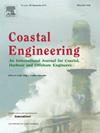Flexible adaptation strategies for managing compound climate change risks in port infrastructures
IF 4.5
2区 工程技术
Q1 ENGINEERING, CIVIL
引用次数: 0
Abstract
Port infrastructures are increasingly exposed to the impacts of compound climate hazards, yet current adaptation strategies often lack the flexibility required to deal with uncertain future conditions. This study presents a novel framework to design flexible adaptation strategies for port infrastructures, integrating compound climate risk assessment with an operational monitoring strategy. The framework identifies key climate drivers and their interactions, evaluates adaptation options, and defines a set of signposts, tipping points, and triggers to inform timely decision-making. The approach is applied to a case study at the Port of Llanes (Spain), demonstrating how adaptation options can be prioritized and adjusted in response to evolving climate risks. Results highlight the relevance of monitoring the combined effects of waves, sea level, and wind to anticipate infrastructure failures and service disruptions. This work offers an actionable methodology that port authorities can integrate into master plans to ensure climate-resilient operations, while providing a scalable tool for other critical coastal infrastructures.
管理港口基础设施复合气候变化风险的灵活适应战略
港口基础设施越来越多地受到复合气候灾害的影响,但目前的适应战略往往缺乏应对不确定未来条件所需的灵活性。本研究提出了一个新的框架来设计灵活的港口基础设施适应策略,将复合气候风险评估与运营监测策略相结合。该框架确定了关键的气候驱动因素及其相互作用,评估了适应方案,并确定了一套路标、临界点和触发点,以便及时为决策提供信息。该方法应用于莱恩斯港(西班牙)的一个案例研究,展示了如何根据不断变化的气候风险对适应方案进行优先排序和调整。研究结果强调了监测海浪、海平面和风的综合影响与预测基础设施故障和服务中断的相关性。这项工作提供了一种可操作的方法,港口当局可以将其纳入总体规划,以确保气候适应型运营,同时为其他关键沿海基础设施提供可扩展的工具。
本文章由计算机程序翻译,如有差异,请以英文原文为准。
求助全文
约1分钟内获得全文
求助全文
来源期刊

Coastal Engineering
工程技术-工程:大洋
CiteScore
9.20
自引率
13.60%
发文量
0
审稿时长
3.5 months
期刊介绍:
Coastal Engineering is an international medium for coastal engineers and scientists. Combining practical applications with modern technological and scientific approaches, such as mathematical and numerical modelling, laboratory and field observations and experiments, it publishes fundamental studies as well as case studies on the following aspects of coastal, harbour and offshore engineering: waves, currents and sediment transport; coastal, estuarine and offshore morphology; technical and functional design of coastal and harbour structures; morphological and environmental impact of coastal, harbour and offshore structures.
 求助内容:
求助内容: 应助结果提醒方式:
应助结果提醒方式:


